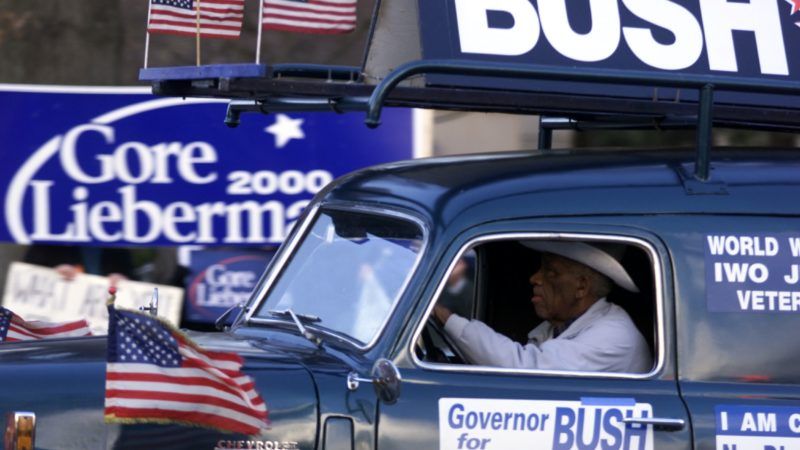Election 2000: The Last Holiday-from-History Election
"Do we have a president yet?" we laughed.

A range of pundits have been suggesting that this year's election could end up being contested, much as the 2000 election was. Let's compare then and now.
Back in 2000, America was still enjoying the "holiday from history" that followed the fall of the Soviet empire. Military spending was at a post–World War II low of just 2.9 percent of GDP. Unemployment in October 2000 was 3.9 percent, a 30-year low. The dotcom bubble was still buoying the stock market. Around 20 percent of both Democrats and Republicans had "very unfavorable" views about the other party. (By 2016, that had risen to 55 and 58 percent, respectively.)
The major candidates, Al Gore and George W. Bush, were both conventional politicians. The big issues of the day were Social Security and school vouchers. In an October 4, 2000, New York Times article reporting voter sentiments at a neighborhood presidential-debate-watch barbecue in Atlanta, host Bobby Milstein said: "This is definitely an election of the lesser of two evils." He added, "Clinton, he had a vision in a way. Gore doesn't have that. Bush doesn't have that. In the end, either of them are probably capable."
As we now know, the 2000 election was closely contested and its outcome ultimately depended on which candidate was awarded Florida's electoral votes. I won't get into the details. Suffice it to say that votes were counted and recounted; court cases were filed, decided, and appealed; and on December 12, the U.S. Supreme Court ruled 5–4 for Bush. Gore graciously conceded the next day.
During that November, my wife Pamela and I were vacationing with a group of college friends in Virgin Gorda. As we were enjoying the white sand beaches at the Baths and Savannah Bay, we were basically out of the reach of regular media. Whenever we saw someone new to the island, we would lightheartedly ask, "Do we have a president yet?" After being told no, not yet, we would return unconcernedly to our rum punches.
2020 is way different.
During the presidential candidate debate between Joe Biden and Donald Trump on Tuesday, moderator Chris Wallace noted that eight states have laws prohibiting their electoral authorities from counting mail-in ballots prior to Election Day—November 3. Wallace observed that we're likely not "to know on election night who the winner is," adding that "it could be days, it could be weeks." Trump interjected: "Could be months."
Wallace then asked both candidates, "Will you urge your supporters to stay calm during this extended period, not to engage in any civil unrest? And will you pledge tonight that you will not declare victory until the election has been independently certified?"
Instead of making that reasonable promise, President Trump once again suggested that if the tally doesn't go his way that he will challenge the election results in the courts, and perhaps the streets.
Come to think of it, it might not be a bad idea to be out of the country after I vote this November too. Assuming, that is, that anyplace would accept travelers from the COVID epicenter.


Show Comments (49)